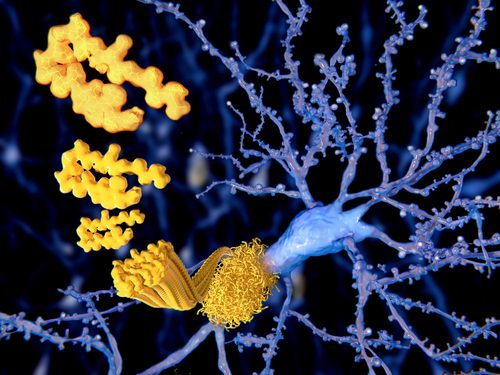Aduhelm (aducanumab), approved for Alzheimer’s disease in the U.S., is most appropriate for people with mild cognitive impairment (MCI) due to the disease or early Alzheimer’s dementia, the disorders for which it was tested in clinical trials and subsequently approved, according to experts from the scientific community. The experts discussed the path forward for Aduhelm…
About Alzheimer’s Disease
Walking into a room and forgetting why you went into the room is normal. Walking into a room and forgetting what room you are in is not normal. Alzheimer’s disease is the most common form of dementia and affects one in ten people over the age of 65. Unfortunately, the exact cause of Alzheimer’s disease is not fully understood however leading scientific experts in the field attribute the illness to the irreversible and progressive generalized degeneration of the brain. Alzheimer’s disease goes well beyond the forgetfulness that may accompany aging, and typically first signs include difficulty remembering current information or performing new tasks. Ongoing hallmark symptoms include impaired memory function, difficulty performing everyday tasks, and neurobehavioral abnormalities. Currently, there is no known cure for Alzheimer’s disease, and multi-disciplinary treatment focuses on symptom management and limiting progression.
Conditions
Alzheimer’s News
Cholinesterase Inhibitors Found to Slow Long-term Cognitive Decline
Cholinesterase inhibitors, a class of medicines used for treating Alzheimer’s disease, are linked to long-term reductions in cognitive decline and in the risk of death among patients, a recent study found. In fact, the cognitive benefits and reduced mortality lasted for up to five years after diagnosis, the researchers said. Among the three cholinesterase inhibitors…
Gosuranemab Fails TANGO Trial; Biogen Stops Development
Gosuranemab, an investigational antibody against the tau protein, failed to meet its primary and exploratory efficacy goals in the TANGO Phase 2 study, its developer, Biogen, has announced. Now, the TANGO trial has been terminated and Biogen will cease the clinical development of gosuranemab as a potential therapy for Alzheimer’s disease patients, the company said. “While…
Mechanisms Behind Anavex 2-73’s Benefits Highlighted in Review
Activation of the sigma-1 receptor or SIGMAR1 — whose production is typically increased with age, but reduced in people with Alzheimer’s disease — drives a series of neuroprotective effects, including the clearance of unnecessary or damaged cellular components, a review study highlights. This supports the therapeutic potential of Anavex 2-73 (blarcamesine), and Anavex 3-71 (AF710B),…
Aduhelm Approval Greeted With Joy, Concern in Alzheimer’s Community
A new treatment for people with Alzheimer’s disease — the first approved by the U.S. Food and Drug Administration (FDA) in nearly 20 years — will be available soon in the U.S. But the reception being given to Aduhelm (aducanumab) is mixed. Some patients and caregivers welcome the news after years of repeat clinical trial failures and…
Dosing Starts in Phase 3 Trial of ALZ-801 in Patients With APOE Variant
A first patient has been dosed in APOLLOE4, a Phase 3 trial testing the efficacy and safety of ALZ-801, an investigational oral treatment by Alzheon for people carrying a specific genetic variant linked to early onset, rapidly progressive Alzheimer’s disease. ALZ-801 is a small molecule designed to prevent the formation and clustering of harmful proteins that…
$5M Grant Supports Phase 1 Trial of AAV2-BDNF, Potential Gene Therapy
The National Institute on Aging (NIA) has awarded a five-year grant worth up to $5 million to support a clinical trial that will test AAV2-BDNF, an investigational gene therapy, in people with Alzheimer’s disease or mild cognitive impairment, which often precedes dementia. The therapy aims to deliver the gene BDNF to cells within specific regions of the…
ANVS401 Improves Cognition in Alzheimer’s and Parkinson’s, Data Show
Annovis Bio’s oral therapy ANVS401 (also known as Posiphen) led to significant improvements in cognition in patients with Alzheimer’s disease, according to data from the first patient group in a Phase 2a study. The improvements were also observed in patients with Parkinson’s disease enrolled in the study. “The results from the first cohort of 14…
FDA Approves Aduhelm, First Targeted Alzheimer’s Therapy
For the first time in almost 18 years, the U.S. Food and Drug Administration (FDA) has approved a new treatment — Aduhelm, formerly known as aducanumab — for Alzheimer’s disease, and a first targeted treatment for patients. With this approval, Aduhelm becomes the first disease-modifying therapy for Alzheimer’s, and the first such therapy to come under FDA…
June Is Alzheimer’s and Brain Awareness Month
From participating in a fundraiser on the longest day of the year, to sporting purple gear and sharing stories, supporters are marking Alzheimer’s & Brain Awareness Month, as they do each June. The purpose is to raise awareness among the general public, as well as among policymakers, public authorities, industry representatives, scientists, and health professionals.…
Alzheimer’s Association on Aducanumab: Chance for ‘More Time’ Merits Approval
In a few days, the U.S. Food and Drug Administration (FDA) is expected to announce whether or not it decided that aducanumab, an investigational treatment for Alzheimer’s disease developed by Biogen, merits approval and wide clinical use. The medication’s review marks the first time in nearly two decades that the FDA has considered approving a…
ProMIS, Selexis to Develop Antibody Targeting Toxic Amyloid Beta
ProMIS Neurosciences will advance the development of PMN310, its manmade antibody designed to target the toxic forms of amyloid beta that underlie Alzheimer’s disease. The first step in the manufacturing of PMN310 will be carried out by Selexis with its proprietary CHO-K1 cell line, part of the company’s SUREtechnology platform. The platform uses Selexis’ optimized, high-performance mammalian (Chinese…













